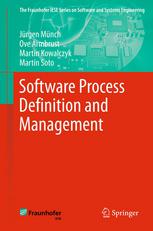

Most ebook files are in PDF format, so you can easily read them using various software such as Foxit Reader or directly on the Google Chrome browser.
Some ebook files are released by publishers in other formats such as .awz, .mobi, .epub, .fb2, etc. You may need to install specific software to read these formats on mobile/PC, such as Calibre.
Please read the tutorial at this link: https://ebookbell.com/faq
We offer FREE conversion to the popular formats you request; however, this may take some time. Therefore, right after payment, please email us, and we will try to provide the service as quickly as possible.
For some exceptional file formats or broken links (if any), please refrain from opening any disputes. Instead, email us first, and we will try to assist within a maximum of 6 hours.
EbookBell Team

5.0
110 reviewsThe concept of processes is at the heart of software and systems engineering. Software process models integrate software engineering methods and techniques and are the basis for managing large-scale software and IT projects. High product quality routinely results from high process quality.
Software process management deals with getting and maintaining control over processes and their evolution. Becoming acquainted with existing software process models is not enough, though. It is important to understand how to select, define, manage, deploy, evaluate, and systematically evolve software process models so that they suitably address the problems, applications, and environments to which they are applied. Providing basic knowledge for these important tasks is the main goal of this textbook.
Münch and his co-authors aim at providing knowledge that enables readers to develop useful process models that are suitable for their own purposes. They start with the basic concepts. Subsequently, existing representative process models are introduced, followed by a description of how to create individual models and the necessary means for doing so (i.e., notations and tools). Lastly, different possible usage scenarios for process management are highlighted (e.g. process improvement and software process simulation).
Their book is aimed at students and researchers working on software project management, software quality assurance, and software measurement; and at practitioners who are interested in process definition and management for developing, maintaining, and operating software-intensive systems and services.